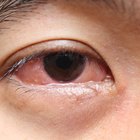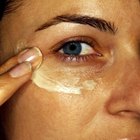
Photodisc/Photodisc/Getty Images
Milestone is a liquid herbicide created and distributed by Dow AgroSciences. It is used to kill broadleaf weeds and, according to Dow, is specifically designed for use on ranges and pastures. Its active ingredient is aminopyralid, a chemical created and patented by Dow. Although Milestone is designed to be effective at much lower concentrations than similar herbicides, it still poses health risks to humans, particularly if ingested or applied to the skin or eyes.
Eye Irritation
Milestone herbicide may cause eye irritation, according to the product's Materials Safety Data Sheet, or MSDS. To remove Milestone from the eyes, rinse eyes thoroughly with clean water for several minutes. After the first minute or two of washing, remove any contact lenses. If eye irritation or similar eye symptoms persist, the patient should see an ophthalmologist, or his or her regular physician if an ophthalmologist is not available. To avoid eye contact, the product's Specimen Label recommends that users wear long clothing and gloves, and stand upwind of any application of Milestone.
Skin Irritation
A risk of skin irritation from exposure to Milestone herbicide also exists, according to the product's MSDS information. If you experience skin irritation from exposure to Milestone, remove your clothes and wash any areas of skin that may have come in contact with the herbicide. Contact your physician if skin irritation persists. Although there is no specific antidote for Milestone herbicide, even prolonged skin exposure is not likely to cause death, according to Dow.
Lung Irritation
Although testing has not revealed that Milestone herbicide causes any severe or long-term damage to the lungs, according to the product's MSDS information, inhalation of Milestone may still cause irritation of the respiratory system, including the lungs, in some people. Always spray or handle Milestone in a well-ventilated area, preferably outdoors. If you inhale the product, move away from the area and into a place with clean, well ventilated air. If you experience any irritation or other symptoms in your nose, mouth, throat or chest, contact a physician.
Related Articles

Dangers of Spray on Tan

What Is Eucerin Cream?

Palmolive Shampoo Ingredients

How to Use Colloidal Silver to Kill ...

Possible Side Effects of Obagi

What Is Aloe Good For?

Chamomile Essential Oil Benefits

How to Make Temporary Tattoos Last ...

Can Hair Dye Cause Severe Itching of ...

The Side Effects of Sodium Bisulfite

About Hibiclens

Neutrogena Ingredients

What Are the Benefits of Extrapone ...

The Best Facial Moisturizers for People ...

Can I Scotchguard My Vera Bradley ...

The Benefits of Lemongrass for Skin

Aloe Vera & Seborrheic Dermatitis

Shampoos for Hair Loss Due to ...

The Effects of Inhaling Air Dusters

Is Proactive Too Strong for Sensitive ...
References
Writer Bio
A.L. Kennedy is a professional grant writer and nonprofit consultant. She has been writing and editing for various nonfiction publications since 2004. Her work includes various articles on nonprofit law, human resources, health and fitness for both print and online publications. She has a Bachelor of Arts from the University of South Alabama.
Photo Credits
Photodisc/Photodisc/Getty Images